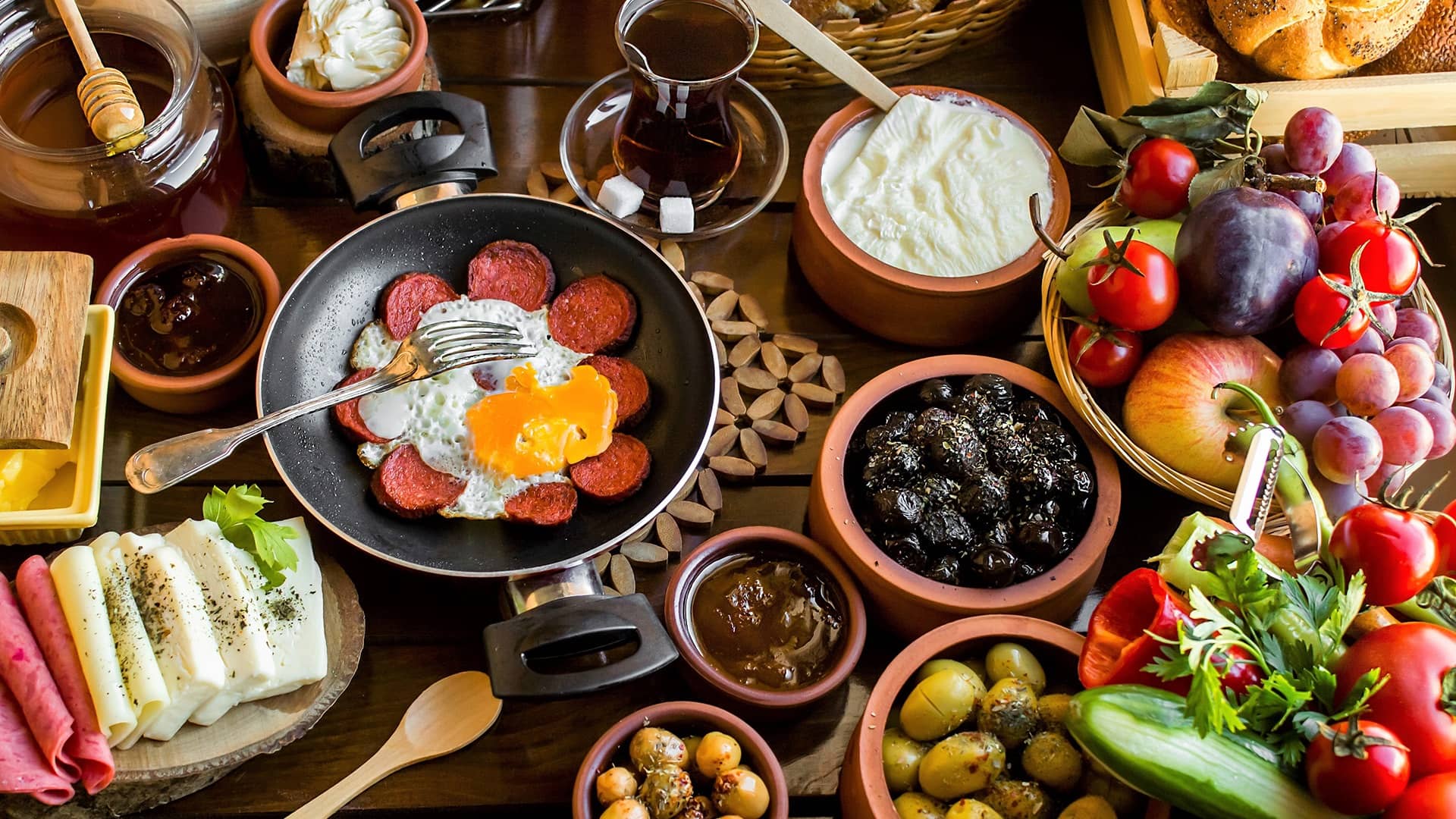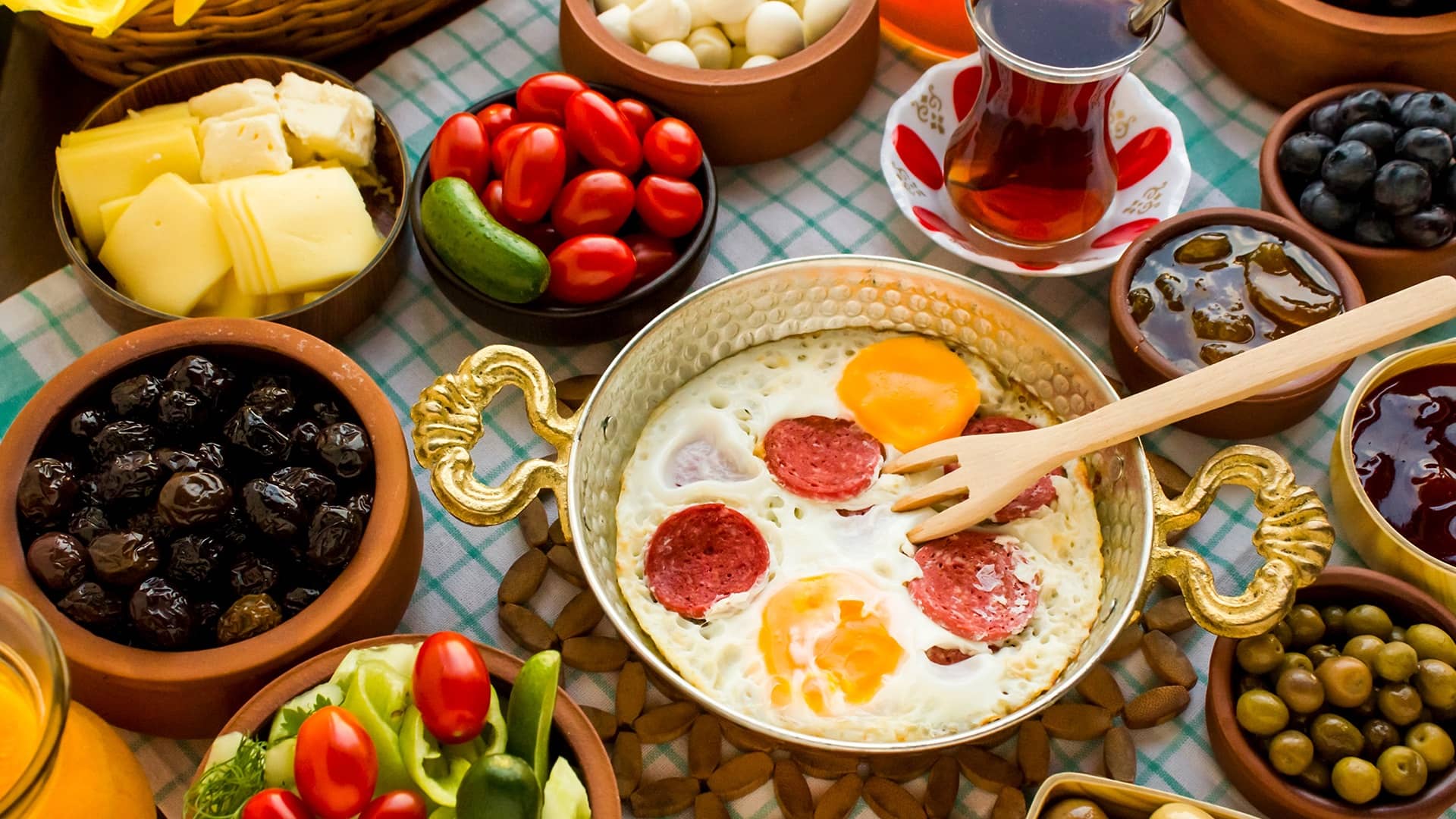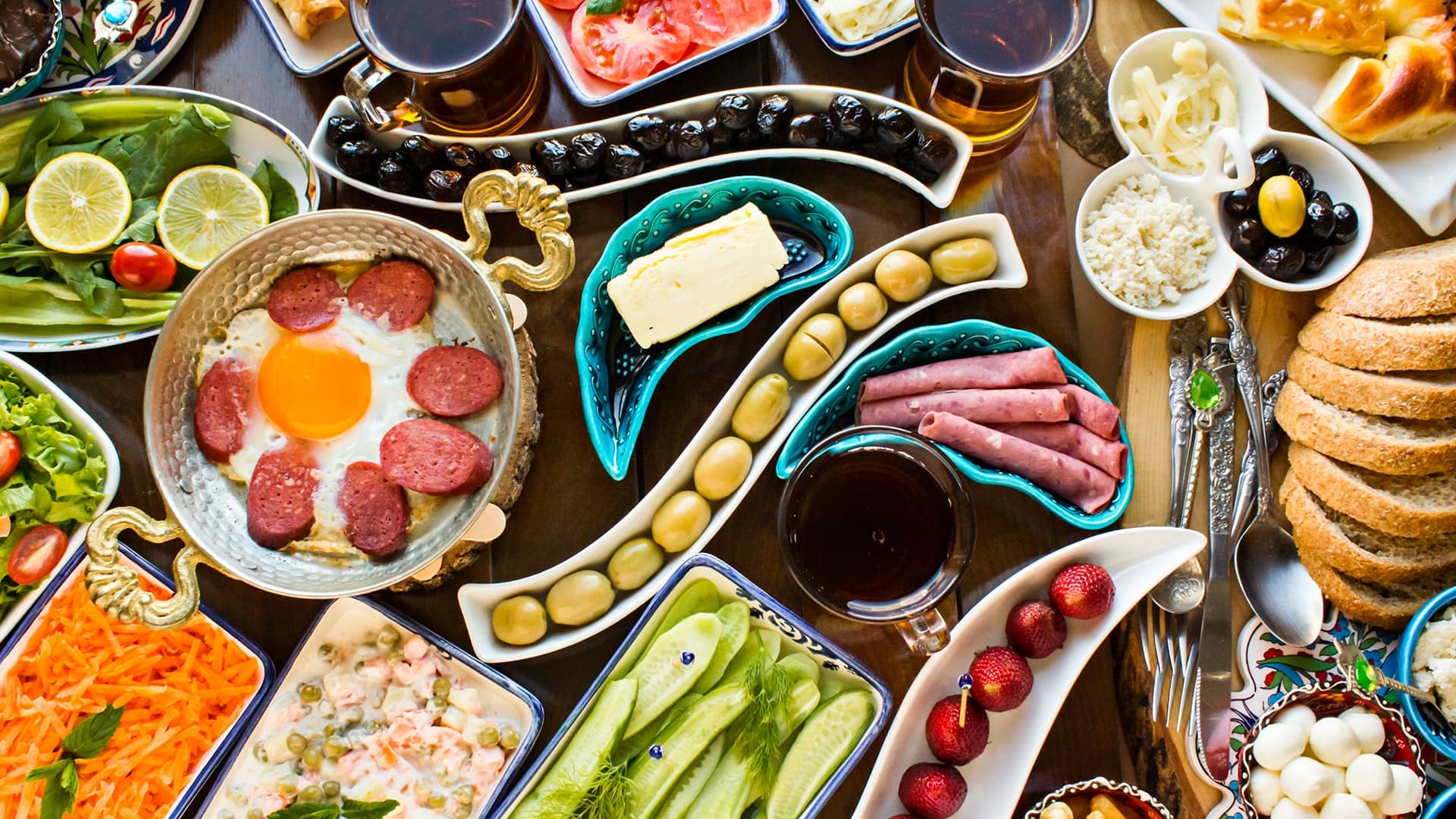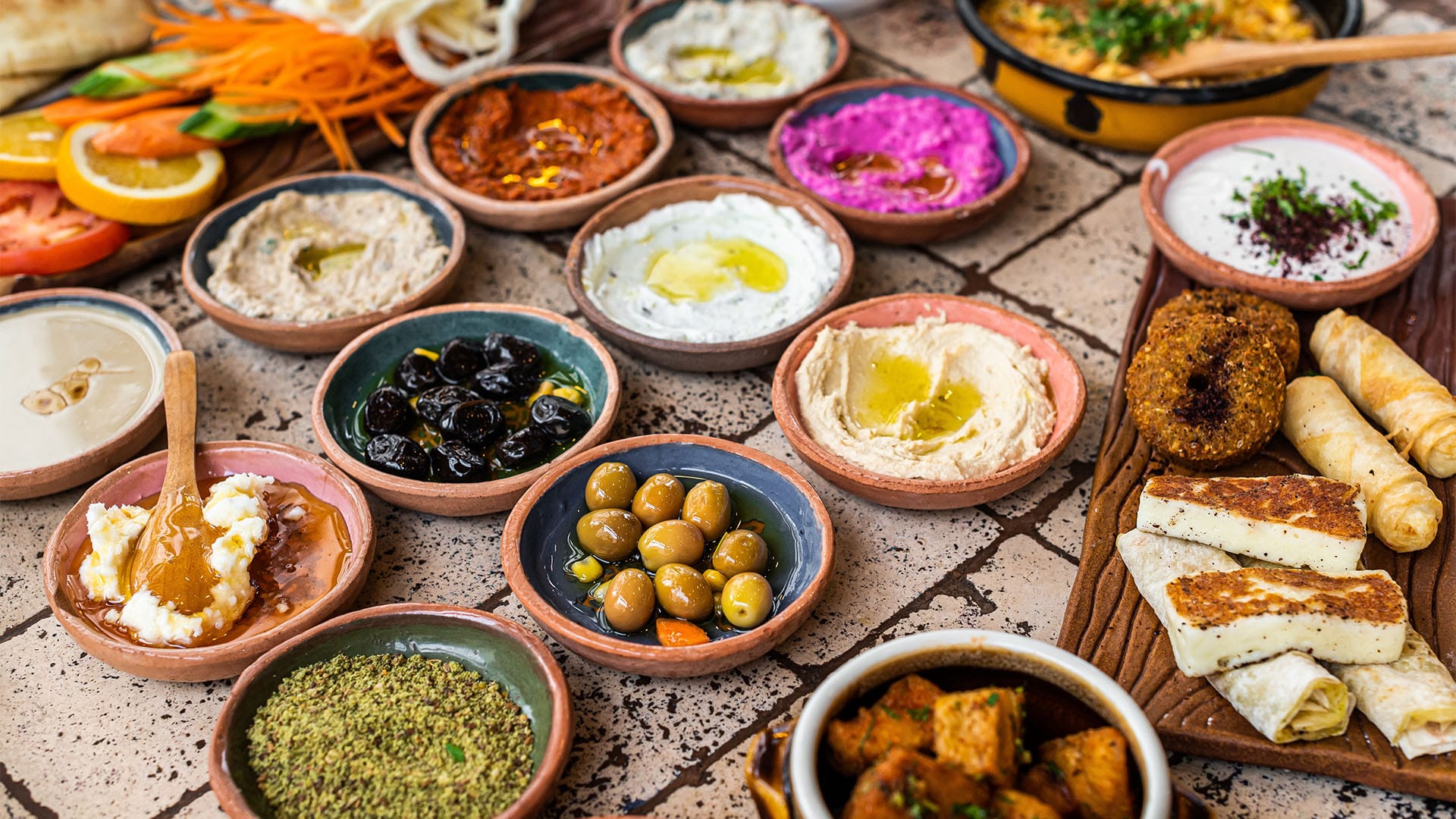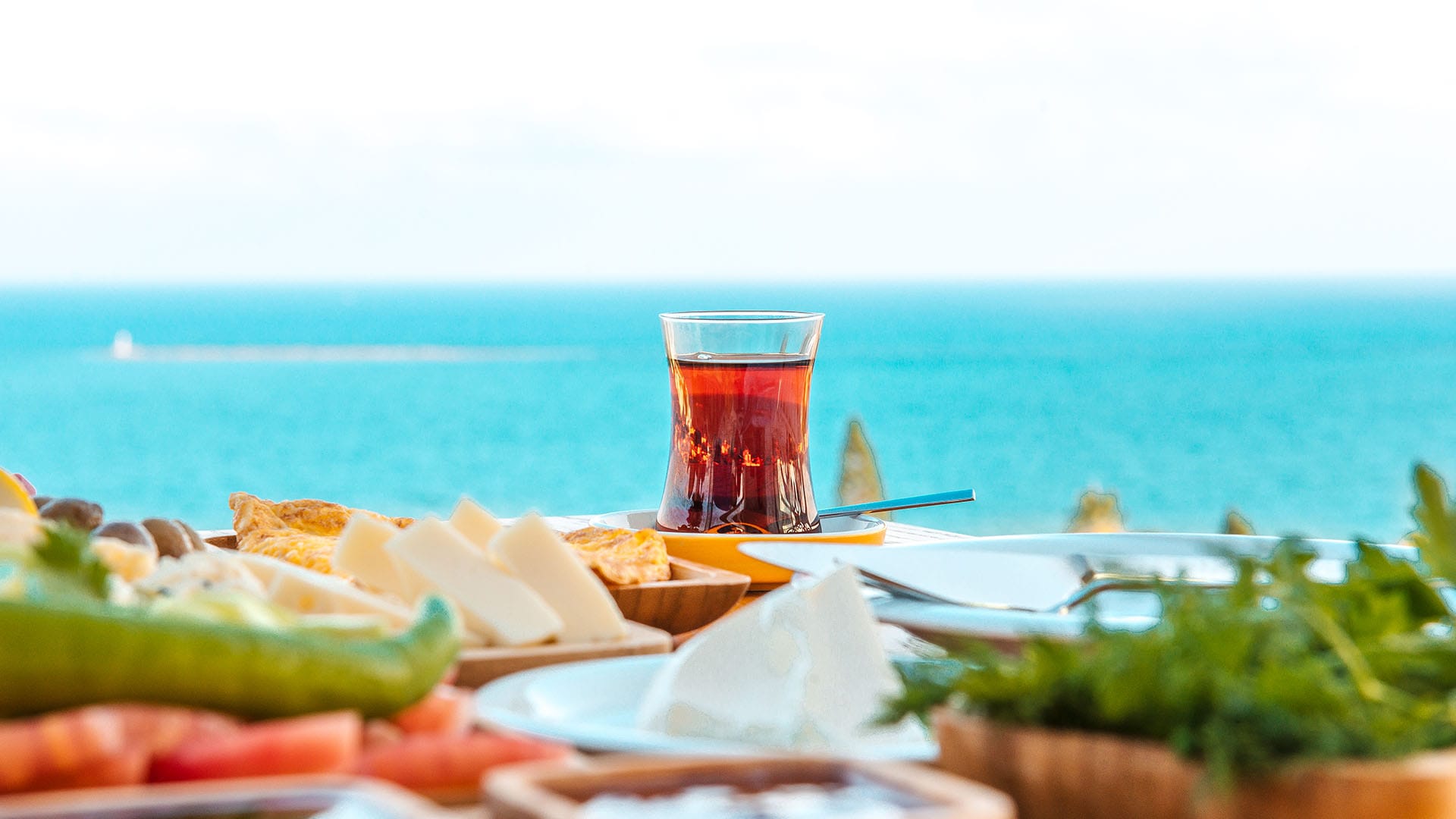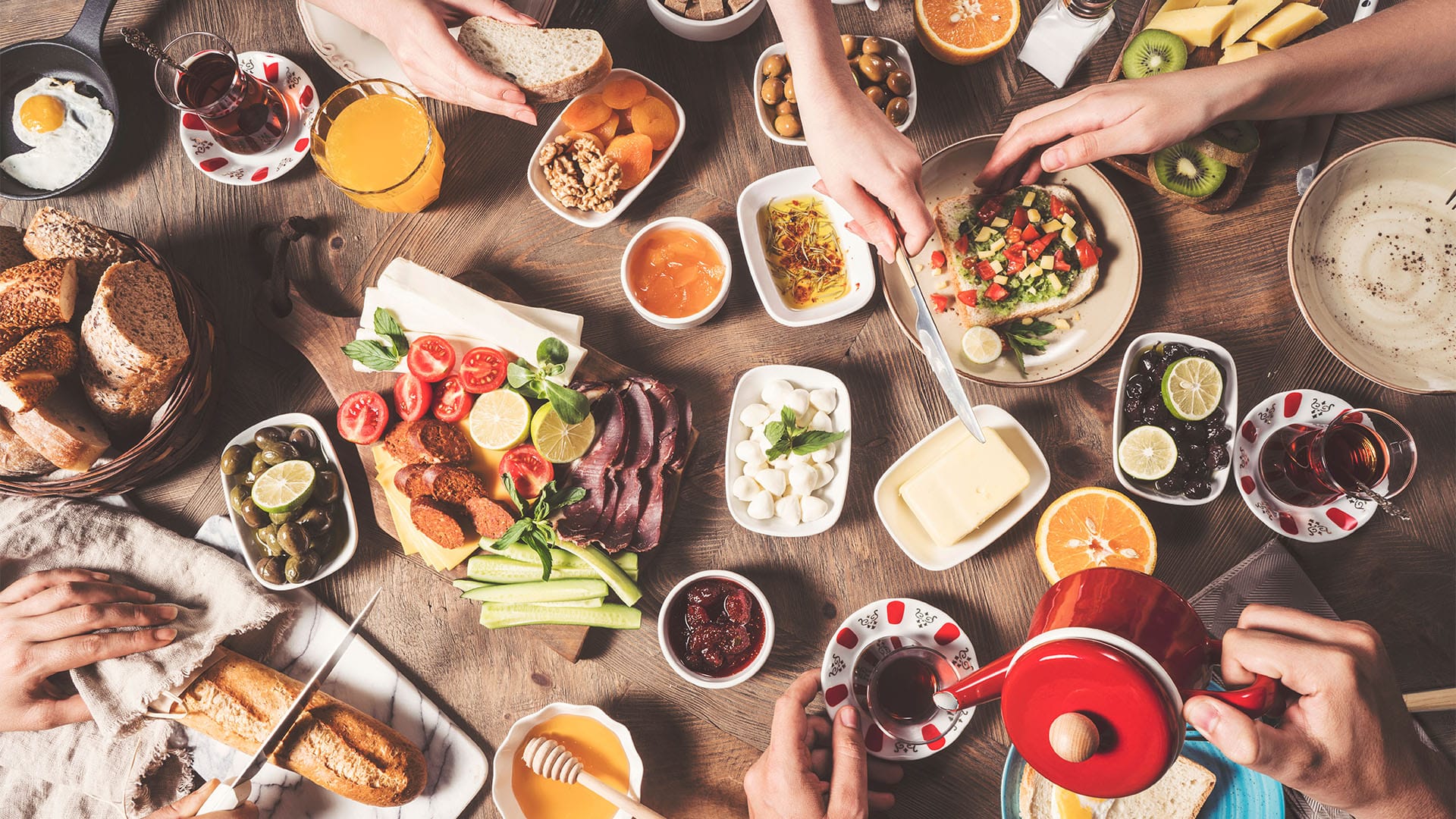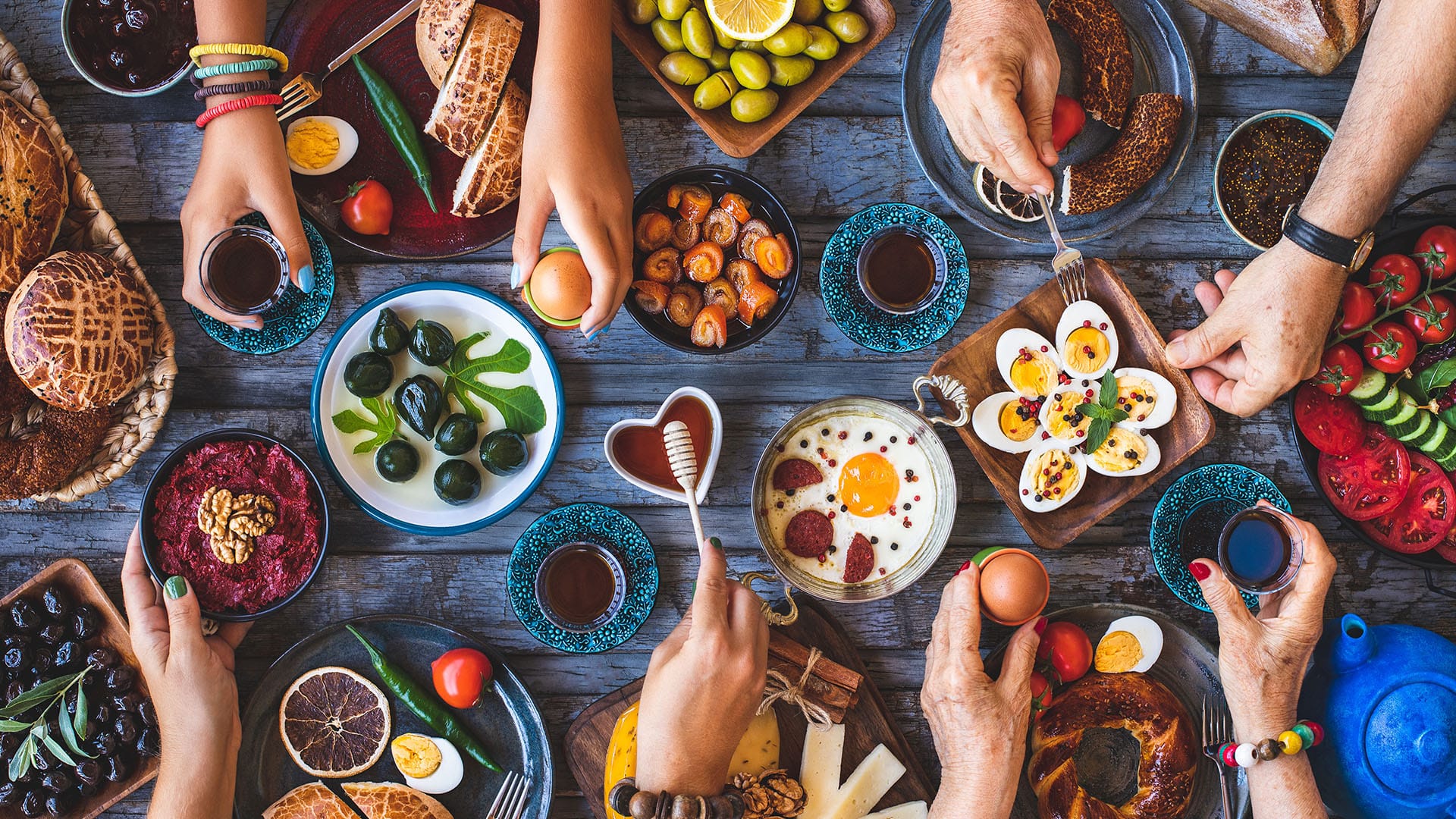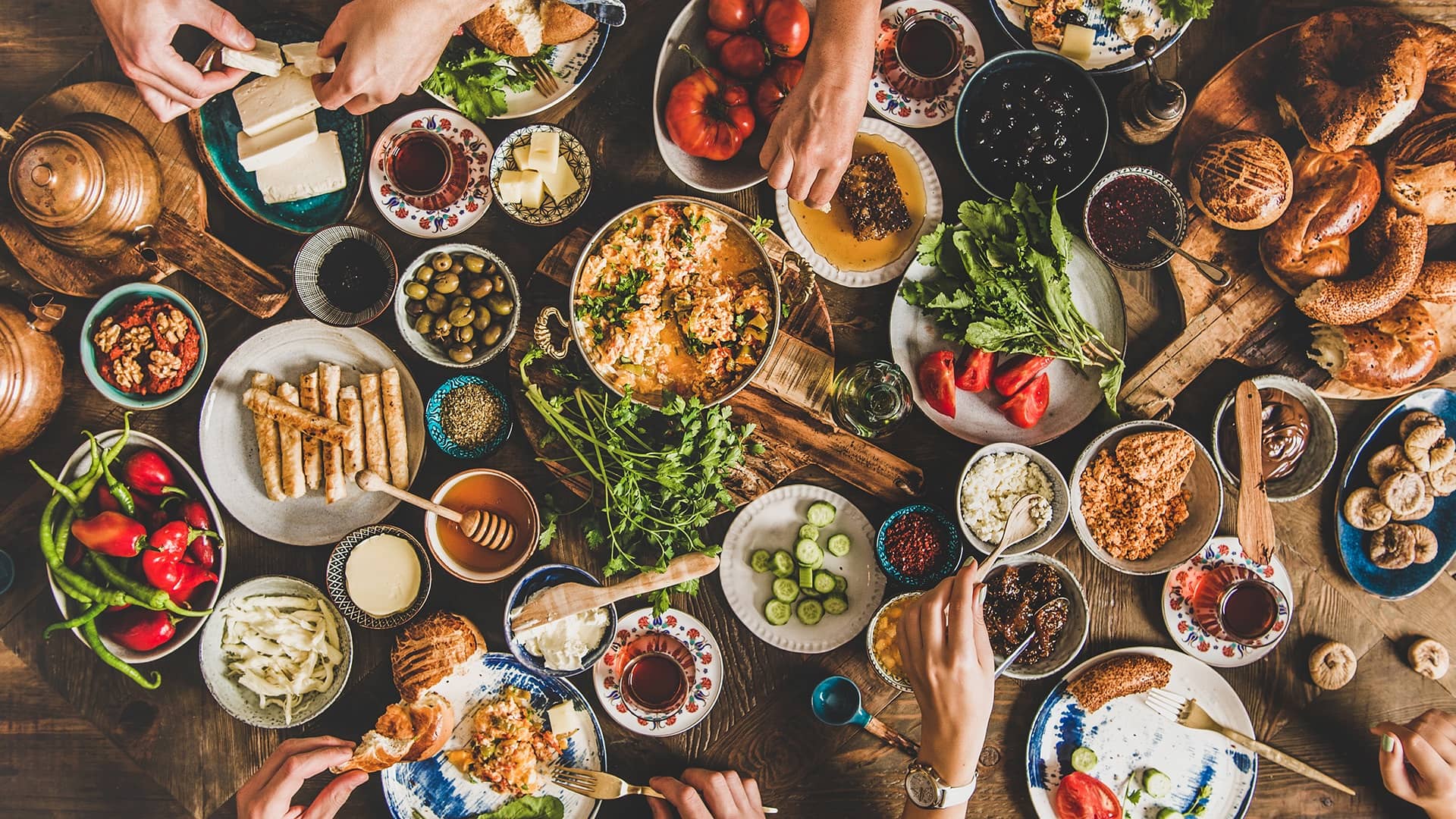

experiences
The Banquet Breakfast
The Big Breakfast
The word Kahvaltı comes from two words meaning “before coffee”. Traditionally, Turkish coffee is strong and is usually drunk after breakfast to aid digestion. Turks usually drink tea with breakfast.
The Turkish people love their tea, and drinking tea is a social experience and a sign of hospitality. Turks do like coffee, but as they serve their coffee particularly strong, it’s not advisable to drink it on an empty stomach.
A Turkish breakfast isn’t a single dish, but a series of bite-sized Turkish delicacies. A classic Kahvaltı spread varies by region but generally consists of cheese, pastries, dips and sauces, olives, eggs, fresh tomatoes, cucumbers, bread, meats, honey, and various types of jam. And of course, the Kahvaltı isn’t complete without a bottomless glass of freshly brewed Çay (Tea).
Many who have the opportunity of several Kahvaltı experiences in cafes and restaurants in İstanbul, might notice a pattern. First comes freshly brewed black tea in a tulip-shaped glass as soon as you sit down. As you sip the tea, you’re given a small plate and cutlery to prepare for the serving of the dishes that follow. Then comes a copper pan of eggs, followed closely by a bowl of tomatoes and cucumbers, followed by a platter of 10 kinds of cheese, followed by a couple of bowls of different types of olives, followed by a basket of bread, followed by a basket of pastries.
And just when you think it’s all over, another waiter arrives with a whole tray full of small plates. The contents range from savoury to sweet: tomato paste, olive oil, hummus, yoghurt, spices, more olives, caramel, clotted cream, various jams, and honey. Finally, there’s a plate of fresh fruit and maybe a glass of orange juice to wash down the feast.
Your first Kahvaltı experience
The first question you should ask yourself when having your first Kahvaltı is, “Where should I even start?” First, reach for a Yufka, an unleavened Turkish flatbread. After one bite, you’ll wonder how you ever lived without this bread. From then on, decision fatigue quickly fades, because everything on the table will satisfy you.
The point here’s not to feast until the elasticity of your waistline is put to the test, but to try a bit of everything. By the time you dip your lokma, a fried sweet bread, into a cream and honey mixture, you might, at last, understand why Turkish Kahvaltı is still a tradition even in today’s fast-paced world.
However, with today’s busy schedules, Turkish families have changed their weekday breakfasts to Simit and Çay (Turkish Tea). And at weekends, it’s an elaborate meal taken in the late morning and covers the whole table.
As mentioned before, Turkish breakfast varies from region to region. In most cases, however, there are the same basic foods that make up a traditional breakfast. When a guest comes to your home, breakfast becomes a special occasion and is served buffet style. Essentially, Turkish breakfast isn’t just a meal, it’s a social experience!
A famous Turkish poet, Cemal Süreya, once said, “I don’t know what you think of eating, but breakfast must have something to do with happiness.” Every breakfast lover agrees with Mr Süreya, because breakfast can be an absolutely delicious meal, especially in İstanbul.
It’s a meal worth lingering over, so make sure you’ve got the time (and the space in your belly) for at least one fabulous Turkish breakfast while you’re exploring food in İstanbul! For Turks, there’s Kahvaltı every single day of the week, and it’s as much a ritual on Wednesday as it is on Sunday.
So where do we start?
Warm Fresh Bread Selection, don’t even think about going on a keto diet in Türkiye! Turks love their bread. Although there’s no specific breakfast bread, you’ll actually find all kinds of bread on the table that are good.
The most common bread you’ll see is Simit, freshly baked, molasses-dipped, and sesame-crusted dough. Simit is the real star of the Kahvaltı spread; it’s the ideal base for your cheese and jam. Simit is often sold on street corners, in metro stations, and in practically every bakery in Türkiye. Usually, the Turkish bagel is torn into smaller pieces and dipped in cheese, jam and other tasty condiments. For many people, simit is the perfect breakfast when you are on the go because it’s so readily available and rarely costs more than a few Turkish liras. Another typical bread you may find on the table is Bazlama, a flatbread also known as “village bread”.
Flaky Filling Pastries
Turkish breakfast rarely includes a sweet pastry, except for one that is highly recommended, Pişi. It’s a deep-fried puff pastry, sometimes filled with cheese. Many Turks dip it in their tea, but visitors may prefer to dip it in honey!
Favourite pastries include Börek, it is made of thin sheets of filo pastry filled with cheese or minced meat. Sometimes Börek is also served filled with potatoes or spinach and white cheese. An absolute favourite for some is the Su Böreği!
Delicious Dairy - Artisanal Cheeses And Yoghurt Spreads and Drinks
Türkiye has a wide variety of fruits, vegetables, and grains, but if you think it’s easy to eat vegan, you’re wrong! Much of Turkish cuisine consists of meat, cheese, and eggs. Almost every Turkish breakfast is served with a variety of artisanal cheeses made from goat’s, sheep’s, or cow’s milk.
Beyaz Peynir (White Cheese) is the most common cheese served for breakfast. If you like cheese with a twist, you must try Tulum cheese, a crumbly goat cheese mixed with walnut halves and melted butter. Another favourite is Dil Peynir, a spreadable cheese that tastes like mozzarella and has a mild flavour.
Often white cheese is a real perennial favourite, and other contenders include Kaşar, a hard cheese made from unpasteurised sheep’s milk, and Lor, an uncured goat’s cheese that’s like the Turkish version of Cottage Cheese. A favourite amongst the youngsters is Erzurum, which comes in long, stringy pieces and is also called Civil Peyniri. Remember that a real Turkish breakfast doesn’t contain just one of these produce, but at least two or three; the aim is to try as many flavours as possible.
Another popular spread is Labne, a creamy cheese, and the yoghurt based serving is called Süzme, a pureed yoghurt that is thicker. In the summer months, a standard yoghurt drink called Ayran is also served.
One favourite is Kaymak; a thick, sweet, curdled cream that is usually paired with honey.
How Do You Like Your Eggs In The Morning?
Fried Eggs, Scrambled, Boiled, Or Menemen are but a few of the options, but eggs are found in the cuisine of almost every culture in the world. Turks love their eggs and they are a staple in their breakfast. A boiled egg is often served in hotels or hostels as part of breakfast. The common favourite is a fried egg in butter, cooked in a small copper pan called a Sahan.
But one of the most popular egg dishes in Türkiye is Menemen. The dish consists of scrambled eggs, red and green peppers, and tomatoes with some spices like Oregano, cooked in lots of butter. Pita bread is eaten with menemen to soak up the juices from the butter. It tastes similar to an omelette, only juicier and spicier.
A dish that was often cooked for the Ottoman sultans and is still served today is called Çılbır. Çılbır is a poached egg in yoghurt and contains herb butter with chilli flakes.
Of course, it’s not right to talk about eggs without mentioning Sucuk, a dried, spicy beef sausage. Sucuklu Yumurta, meaning eggs with sausage, is the Turk’s answer to “I don’t have anything in the fridge” or “I’ve let dinner slip”. It’s also a popular part of the breakfast, and the best part is dipping small pieces of pide bread in the spicy oil leftover from frying the sausage. If you’re vegetarian, the better option is the previously mentioned Menemen. Carnivores, who could do with a vegetable or two, it’s not uncommon to prepare a Kahvaltı spread that includes both options.
If you like eggs for breakfast, you will have no problem in Türkiye!
Any Chance Of A Light Option?
Of Course! To provide a healthy balance to all the rich food served at a Turkish breakfast, a side dish of cucumbers and tomatoes helps to refresh the palate. And there is nothing like the contrast of texture to eat fresh, raw vegetables alongside a fried egg and cheese. Other vegetables you’ll find on the table are shallots and radishes. The light, crunchy taste goes well with the other side dishes on the table.
Absolutely Nuts About You And Dried Fruits
In the Anatolia region of Türkiye, walnuts are often served for breakfast. Depending on where you are in Türkiye, you may be served different nuts or seeds for breakfast. In the Black Sea region, you might have hazelnuts, in Afyon poppy seeds. It’s fun to travel around Türkiye because each region is proud of its dishes, so you can enjoy unique taste experiences of the Kahvaltı.
Dried fruits usually include dates, apricots, and figs, which are a firm favourite here too, especially with Kaymak (sweet cream) and honey, quite simply delicious!
Green Or Black Olives – You Decide
Olives are an essential part of the menu in Türkiye. Olives are served with almost every meal of the day. On the breakfast table, you will find a selection of green and black olives. In Türkiye, there is such a wide variety of olives, in all colours and sizes and with slightly different tastes, especially if they are drizzled with the wondrous offering of spices from the local Spice Bazaar.
Spreading a Little Taste of Paradise
With a multitude of Honey, Butter & Jam amongst others, it may be difficult to decide what to spread or dip with your Simit; your canvas to tantalise your taste buds.
The beauty of Turkish breakfast is that there is always something savoury or sweet to eat. As well as a mixture of bread and cheese, you will also be served a selection of butter, jam, and honey. Believe it or not, you will also find different types of honey based on the flower/ tree pollen of the region you are visiting.
What can be appreciated about Türkiye is that the spices are all natural with no preservatives and have such a rich flavour. So best not to be shy and try them all.
Black olive spread is a popular option on pide bread if you’re one of those people who likes something salty and savoury early in the morning. If you like it sweeter, drizzle pekmez or molasses over a thin layer of tahini. As the hazelnut is an important export, Turks are also very fond of hazelnut spreads - and yes, that includes Nutella.
As for jams, most grandmothers spend half the year buying the best fruits from the greengrocer; the rest of the year is spent canning and preserving until the grandchildren come along and take home the spoils. Sour cherry, apricot, and fig jam are the classics, and a popular favourite amongst visitors is the wonderfully fragrant bergamot jam.
Polishing Off Breakfast with Turkish Coffee
By now you are probably so full you can barely breathe, but a Turkish breakfast would not be complete without a Turkish coffee to finish it off.
Drinking Turkish coffee is a very special pleasure, a cup of coffee has a great meaning for friendship, love, and shared unforgettable moments. The famous saying "A cup of coffee has forty years of sake" underlines this meaning best. Drinking coffee is so important to Turks that the word "breakfast" was created in their language with the meaning "before coffee".
Of course, you can drink Turkish coffee anywhere in İstanbul, but on İstiklal and Bağdat Street, at the top of Pierre Loti Hill and in the endless rows of cafés and coffee shops in Beşiktaş and along the Bosphorus, there are hidden gems where the cup of Turkish coffee is traditionally prepared before your eyes.
Brewed in a sand-filled pan heated over an open flame. The cezve pan is taken out, put into the sand three or four times, and served in a small cup. The coffee grounds quickly settle to the bottom and make a strong, thick cup of coffee.
Coffee lovers prefer a cup of Turkish coffee that is still smoked and drunk in small sips because it has an intense aroma, an exquisite taste, and a lingering aroma in the mouth. This is the most authentic way to enjoy a cup of Turkish coffee.

